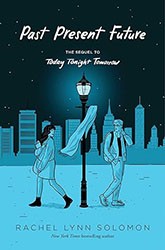Dmitri Digrindakis and Eliana Hoffman are sophomores at a Minnesota high school who meet and recognize that they are drawn to one another. Dmitri is from a close-knit Greek-American family whose pronounced ethnic identity sometimes embarrasses him, while Eliana is Jewish. Both teens are sensitive and talented, but underlying tensions, especially Eliana’s struggles with depression, give their relationship the highs and lows of a Ferris wheel ride. The first-person narration alternates between the two protagonists, creating an intimate and convincing picture of two young adults caught up in the intensity of first love.
Characters’ imperfections play a realistic part in this novel. Eliana is introspective and self-critical, but she can also be absorbed in her own emotions to the exclusion of empathizing with the boy who cares for her deeply. Dmitri often lacks awareness that his attention can be overwhelming. Just as the developing bond between them grows gradually, there is no one moment when it begins to fray. Dmitri is the drummer in a band called Unexpected Turbulence, a name that virtually defines the emotional chaos of adolescence.
There is a marked disparity between the importance of Dmitri’s Greek background and Eliana’s Jewish one. Dmitri’s parents are immigrants; English is their second language. His grandmother, Yia Yia, lives with the family; the influence of both her traditional background and her flexibility about American customs is significant in her grandson’s life. Dmitri jokes about his parents’ values and the religious education that has “brainwashed” him. Yet he continues to be immersed in the language, food, and church of his community, even if he feels ambivalence about them. Eliana’s ties to her Jewish heritage are tenuous, by comparison. There are references to her bat mitzvah, and to a family Hanukkah party held after for the holiday for the sake of convenience.
When Eliana meets Dmitri’s family, there is tension and humor regarding their curiosity about Jews, but no hint of antisemitism. Eliana’s parents seem unconcerned about Dmitri’s background. The uneven nature of their feelings about being Greek and Jewish is not a flaw in the novel, but rather an accurate reflection of social realities. Dmitri’s parents and extended family are rooted in their past, while Eliana’s Jewish parents have apparently distanced themselves from an identity that may still matter to them but no longer defines who they are.
Julie Halpern and Len Vlahos capture the truth of young love through protagonists who are individuals, with thoughts and dialogue that are both consistent with who they are. There is little exaggeration or gratuitous drama, even when Eliana’s recurring depression threatens to upend her life. Secondary characters, including Eliana’s assertive best friend, Janina, and Dmitri’s preternaturally mature younger brother, Nicky, are also thoroughly believable.
Eliana accurately describes the frightening loss of control over her emotions when depression descends. Dmitri also suffers, unable to help her and unwilling to give up his efforts. The authors achieve a balance in evoking empathy for both characters, each one struggling to work through sadness and loss.
Emily Schneider writes about literature, feminism, and culture for Tablet, The Forward, The Horn Book, and other publications, and writes about children’s books on her blog. She has a Ph.D. in Romance Languages and Literatures.





